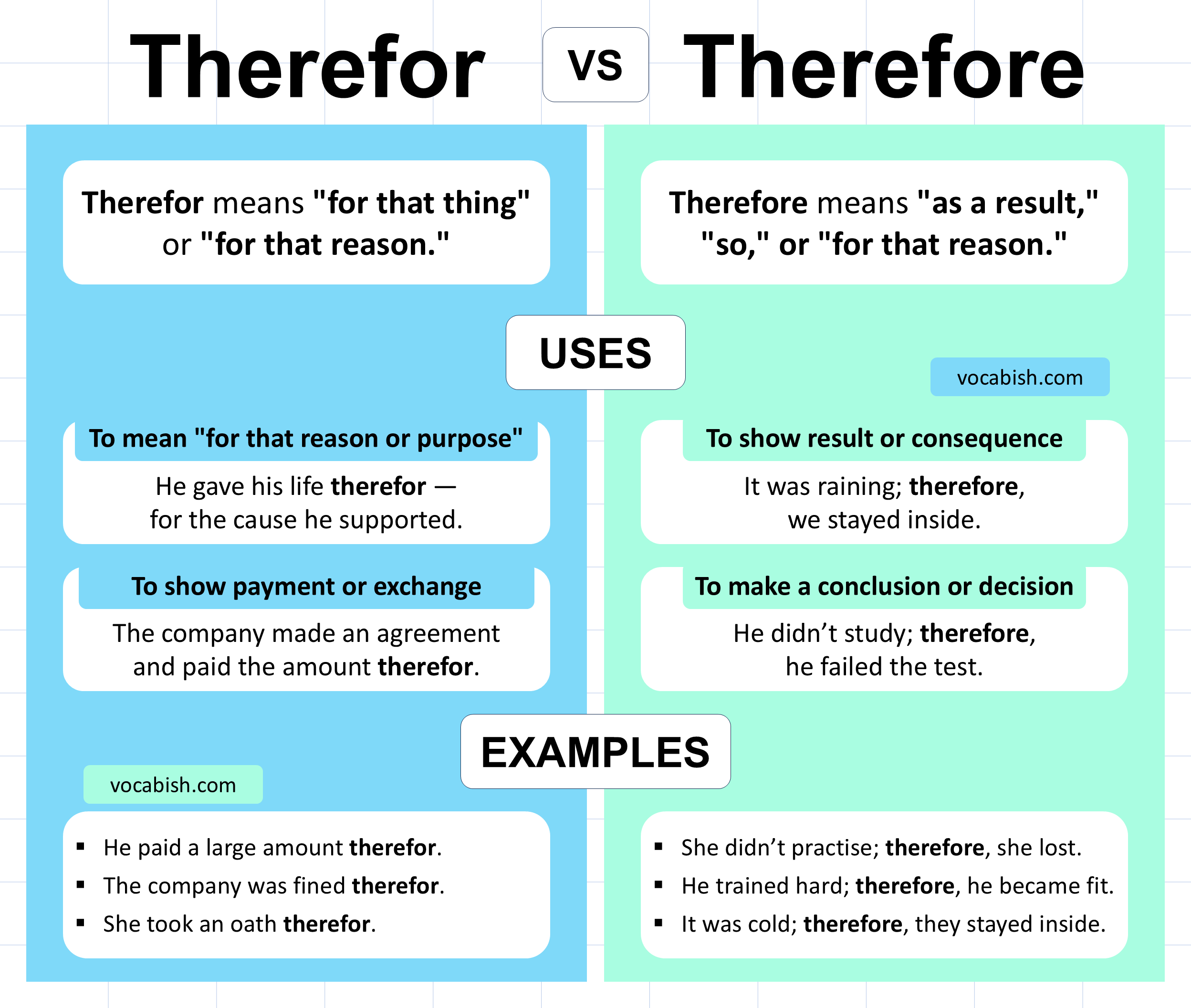Sometimes learners get confused between “therefor” and “therefore.” These two words look very similar, but their meanings are completely different. This short guide will help you understand and remember the difference quickly and easily.
Meanings of Therefor and Therefore
Therefor
Therefor means “for that thing” or “for that reason.” It is a formal and less common word used mostly in legal or religious texts.
For example:
- He worked hard and got rewarded therefor.
- She made a promise and gave her word therefor.
Therefore
Therefore means “as a result,” “so,” or “for that reason.” It is used to show the result or conclusion of something.
For example:
- It was raining; therefore, we stayed inside.
- He didn’t study; therefore, he failed the test.
Difference Between Therefor and Therefore
| Word | Meaning | Use | Example |
|---|---|---|---|
| Therefor | For that thing or reason | Rare, formal writing | He gave his life therefor. |
| Therefore | As a result or consequence | Common in daily English | She was tired; therefore, she slept early. |
Usage of Therefor
Therefor is an old-fashioned and formal word. It is used mainly in legal, written, or religious English. It means for that thing or for that purpose.
To mean “for that reason or purpose”
Example: He gave his life therefor — for the cause he supported.
To show payment or exchange
Example: The company made an agreement and paid the amount therefor.
To express dedication or action for something
Example: She worked day and night therefor, hoping to achieve success.
Usage of Therefore
Therefore is a common word in modern English. It is used to show a result, conclusion, or logical connection between two ideas.
To show result or consequence
Example: It was raining; therefore, we stayed inside.
To make a conclusion or decision
Example: He didn’t study; therefore, he failed the test.
To connect ideas logically
Example: The exam was easy; therefore, everyone passed.
Formal and Informal Usage
| Context | Word to Use | Example |
|---|---|---|
| Formal Writing | Therefor | The payment was made therefor. |
| Informal / Everyday English | Therefore | He missed the bus; therefore, he was late. |
Sentences for Therefor
- He paid a large amount therefor.
- The company was fined therefor.
- She took an oath therefor.
- The lawyer gave his advice therefor.
- He thanked them therefor.
- The soldier fought bravely therefor.
- They built a monument therefor.
- She was honoured therefor.
- The school received funds therefor.
- The artist got credit therefor.
- The worker was rewarded therefor.
- The committee approved payment therefor.
- He gained respect therefor.
- They made an agreement therefor.
- The document was signed therefor.
- The judge gave his decision therefor.
- The donation was accepted therefor.
- He was punished therefor.
- The government thanked the people therefor.
- The contract was made therefor.
Sentences for Therefore
- She was tired; therefore, she went to bed early.
- It was snowing; therefore, the roads were closed.
- He didn’t eat; therefore, he was hungry.
- The shop was busy; therefore, we waited.
- It rained; therefore, the game was cancelled.
- She worked hard; therefore, she succeeded.
- He forgot his key; therefore, he stayed outside.
- They studied well; therefore, they passed.
- The team practised daily; therefore, they won.
- I was late; therefore, I missed the meeting.
- He saved money; therefore, he bought a car.
- The exam was easy; therefore, everyone passed.
- She slept early; therefore, she woke up fresh.
- We were hungry; therefore, we ordered food.
- He trained hard; therefore, he became fit.
- The teacher explained; therefore, we understood.
- The flight was delayed; therefore, we waited.
- She didn’t practise; therefore, she lost.
- The project failed; therefore, they tried again.
- It was cold; therefore, they stayed inside.

Both therefor and therefore look similar, but they have different meanings and usage. Use therefore in modern English to show a result, and reserve therefor for formal or old-style writing.
Learning small differences like these helps you improve your English writing and sound clear and confident.
FAQs about Therefore vs Therefor
What is the difference between therefor and therefore?
Therefor means for that reason or purpose, while therefore means as a result.
Is therefor still used today?
It is rarely used today and appears mostly in legal or old-style English texts.
Can I use therefore in formal writing?
Yes, therefore is suitable for both formal and informal writing.
Which word shows result?
Therefore shows a result or conclusion.
Which word is more common?
Therefore is much more common in modern English writing and speaking.
Read More
